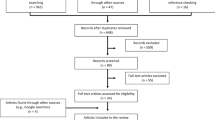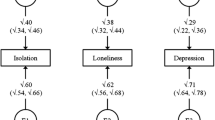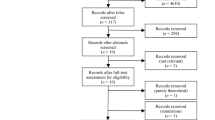Abstract
Background
To a large extent, it is unknown whether work absences other than sickness absence (SA) covered by social benefits such as parental leave, rehabilitation, or unemployment would predict disability pension (DP).
Purpose
We investigated whether part-time work or having received social benefits for sick leave, rehabilitation, or parental leave would be predictors for DP taking into account familial confounding (genetics and shared environment, e.g., social background) in these associations.
Method
A sample of 17,640 complete same-sex Swedish twin pairs was followed from 2000 to 2008 via national registries for their receipt of social benefits and DP including additional baseline questionnaire data. Cox proportional hazard ratios were estimated.
Results
Full-time work was less common (47 %) among those being granted DP during the follow-up compared to those without DP (69 %). Self-reported full-time work, part-time work (≥50 %), and self-employment and registry data of caring for a child were the direct protective factors, whereas self-reported part-time work (<50 %) and long-term SA and registry data on SA, compensation for rehabilitation, and benefits during return to work were the direct risk factors for DP, i.e., independent of familial confounding.
Conclusion
Part-time work and social benefits play different roles in predicting DP. Thus, full-time work, part-time work (≥50 %), self-employment, and benefits for parental leave seem to protect from DP. In contrast, SA and part-time work (<50 %) carry a highly increased risk for DP. Although these associations were mainly independent from several mediating factors, some of the associations seem to be influenced by family situation, social benefits, or severity of diseases.
Similar content being viewed by others
References
OECD. High-level forum. Sickness, disability and work: keeping on track in the economic downturn—background paper, OECD, Paris, France. 2009.
Gjesdal S, Haug K, Ringdal P, Maeland JG, Hagberg J, Roraas T, et al. Sickness absence with musculoskeletal or mental diagnoses, transition into disability pension and all-cause mortality: a 9-year prospective cohort study. Scand J Publ Health. 2009;37:387–94.
Reinholds S, Upmark M, Alexanderson K. Health-selection mechanisms in the pathway towards a disability pension. Work. 2010;37:41–51.
Kausto J, Miranda H, Martimo KP, Viikari-Juntura E. Partial sick leave—review of its use, effects and feasibility in the Nordic countries. Scand J Work Environ Health. 2008;34:239–49.
Viikari-Juntura E, Kausto J, Shiri R, Kaila-Kangas L, Takala EP, Karppinen J, et al. Return to work after early part-time sick leave due to musculoskeletal disorders: a randomized controlled trial. Scand J Work Environ Health. 2012;38:134–43.
Kausto J, Virta L, Luukkonen R, Viikari-Juntura E. Associations between partial sickness benefit and disability pensions: initial findings of a Finnish nationwide register study. BMC Publ Health. 2010;10:361.
Vingard E, Alexanderson K, Norlund A. Swedish Council on Technology Assessment in Health Care (SBU). Chapter 9. Consequences of being on sick leave. Scand J Publ Health. 2004;63(Suppl):207–15.
Waddell G, Burton AK. Is work good for your health and well-being? London: TSO (The Stationery Office); 2006.
Martimo KP, Varonen H, Husman K, Viikari-Juntura E. Factors associated with self-assessed work ability. Occup Med (Lond). 2007;57:380–2.
Krokstad S, Johnsen R, Westin S. Social determinants of disability pension: a 10-year follow-up of 62 000 people in a Norwegian county population. Int J Epidemiol. 2002;31:1183–91.
Haukenes I, Mykletun A, Knudsen A, Hansen H, Maeland J. Disability pension by occupational class—the impact of work-related factors: the Hordaland Health Study cohort. BMC Publ Health. 2011;11:406.
Ropponen A, Silventoinen K, Svedberg P, Alexanderson K, Koskenvuo K, Huunan-Seppälä A, et al. Health-related risk factors for disability pensions due to musculoskeletal diagnoses: a 30-year Finnish twin cohort study. Scand J Publ Health. 2011;39:839–48.
Harkonmäki K, Silventoinen K, Levälahti E, Pitkäniemi J, Huunan-Seppälä A, Klaukka T, et al. The genetic liability to disability retirement: a 30-year follow-up study of 24,000 Finnish twins. PLoS One. 2008;3:e3402.
Narusyte J, Ropponen A, Silventoinen K, Alexanderson K, Kaprio J, Samuelsson Ã, et al. Genetic liability to disability pension in women and men: a prospective population-based twin study. PLoS One. 2011;6:e23143.
Kendler KS, Gatz M, Gardner CO, Pedersen NL. A Swedish national twin study of lifetime major depression. Am J Psychiatry. 2006;163:109–14.
Battie MC, Videman T, Levalahti E, Gill K, Kaprio J. Heritability of low back pain and the role of disc degeneration. Pain. 2007;131:272–80.
MacGregor AJ, Snieder H, Rigby AS, Koskenvuo M, Kaprio J, Aho K, et al. Characterizing the quantitative genetic contribution to rheumatoid arthritis using data from twins. Arthritis Rheum. 2000;43:30–7.
Ministry of Health and Social Affairs. Fact sheet: social insurance in Sweden. 2009.
Svedberg P, Ropponen A, Lichtenstein P, Alexanderson K. Are self-report of disability pension and long-term sickness absence accurate? Comparisons of self-reported interview data with national register data in a Swedish twin cohort. BMC Publ Health. 2010;10:763.
Lichtenstein P, De faire U, Floderus B, Svartengren M, Svedberg P, Pedersen NL. The Swedish Twin Registry: a unique resource for clinical, epidemiological and genetic studies. J Intern Med. 2002;252:184–205.
Ropponen A, Narusyte J, Alexanderson K, Svedberg P. Stability and change in health behaviours as predictors for disability pension: a prospective cohort study of Swedish twins. BMC Publ Health. 2011;11:68.
Gold CH, Malmberg B, McClearn GE, Pedersen NL, Berg S. Gender and health: a study of older unlike-sex twins. J Gerontol B Psychol Sci Soc Sci. 2002;57:S168–76.
Svedberg P, Bardage C, Sandin S, Pedersen NL. A prospective study of health, life-style and psychosocial predictors of self-rated health. Eur J Epidemiol. 2006;21:767–76.
Samuelsson A, Ropponen A, Alexanderson K, Lichtenstein P, Svedberg P. Disability pension among Swedish twins—prevalence over 16 years and associations with sociodemographic factors in 1992. J Occup Environ Med. 2012;54:10–6.
Allebeck P, Mastekaasa A. Swedish Council on Technology Assessment in Health Care (SBU). Chapter 5. Risk factors for sick leave—general studies. Scand J Publ Health Suppl. 2004;63:49–108.
OECD. Sickness, disability and work. Breaking the barriers. Sweden: will the recent reforms make it? OECD, Paris, France. 2009.
Acknowledgments
This work was supported by grants from the Swedish Research Council (521-2008-3054), the Swedish Society of Medicine, the Swedish Council for Working Life and Social Research (PS, KA), and the Karolinska Institutet Centre for Health Care Science. The Swedish Twin Registry is supported by the Department of Higher Education, the Swedish Research Council, and AstraZeneca. AR is supported by an Academy of Finland researcher grant (# 122080).
Author information
Authors and Affiliations
Corresponding author
Rights and permissions
About this article
Cite this article
Ropponen, A., Alexanderson, K. & Svedberg, P. Part-time Work or Social Benefits as Predictors for Disability Pension: a Prospective Study of Swedish Twins. Int.J. Behav. Med. 21, 329–336 (2014). https://doi.org/10.1007/s12529-013-9303-4
Published:
Issue Date:
DOI: https://doi.org/10.1007/s12529-013-9303-4




